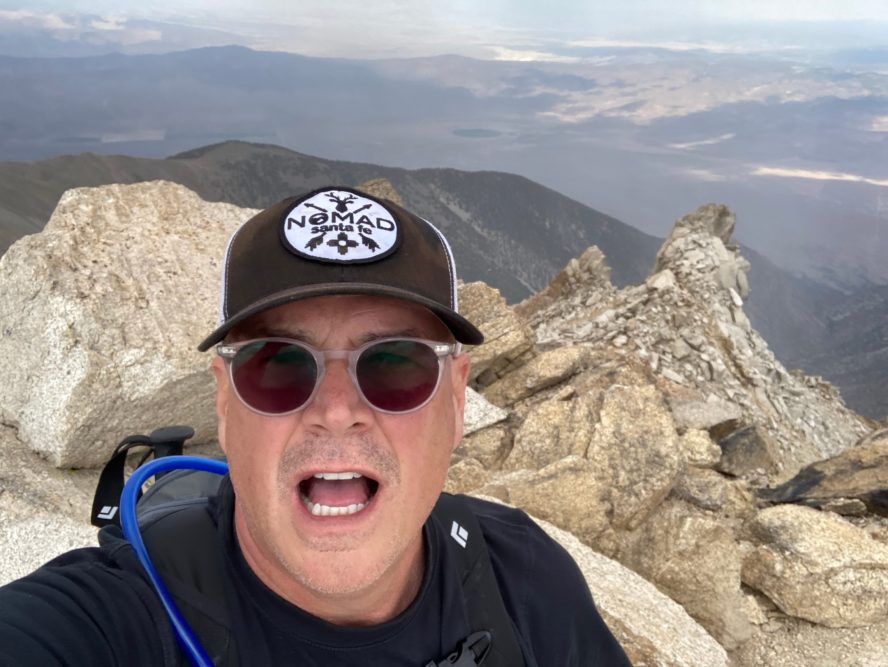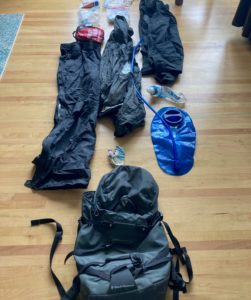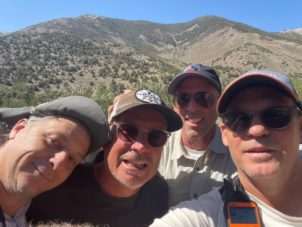
When Ron Bolen, Oklahoma ’86, set out to hike Nevada’s Boundary Peak on a Tuesday morning in July 2021, he had no way of knowing it would turn out far differently from any hike he’d ever taken.
An experienced hiker, he enjoyed taking in the natural beauty of his surroundings during the ascent up the 13,140-foot high mountain. He got to the summit around 12:45 p.m. and wrote his name in the registry book hikers sign to mark reaching the top of the peak. He paused for a few minutes to appreciate the view and snapped a picture to remember the moment.
The stop was brief. He expected the walk back to take about five hours, so he wanted to get going. But just 20 minutes into his descent, Bolen slipped, taking a serious tumble that propelled him down the side of the mountain and about 20 feet off the trail. He was slightly banged up, but not seriously hurt.

Deciding it made more sense to continue from his current location than attempt to climb back up the sharply angled slope, Bolen forged ahead.
“Within a couple of hours, I knew I was in the wrong place,” he said, “but thought I still had a route to cut across and get to my car. I had extra water and rain gear, so I thought I’d spend the night, even though I wasn’t happy to be sleeping outside.”
The next morning, a somewhat rested Bolen tried to backtrack and find another route to the trail. But after several hours, he was still lost. “By Wednesday afternoon,” he said, “I knew I was in real trouble.”
He wasn’t the only one. Bolen’s adult daughters, Meredith and Jessica, were concerned because they hadn’t heard from him.
His established safety protocol was that he’d text right before starting a hike, again when he reached the summit if cell service was available and one last time when he was back at his car. There was very little cell service on the mountain, but surprisingly, he’d been able to text his daughters and a friend near the summit. But he never made that final text.
Unbeknownst to him, his friend and SigEp chapter brother Mark McConnell, ’86, had contacted the park service on Wednesday and, after finding out his car was still in the parking lot, got in touch with Bolen’s daughters as well. Meredith, a teacher, took the lead in organizing a search. A medical resident, Jessica continued her duties as a frontline worker while hoping their dad was OK.
Bolen had run out of water and been nibbling on a Clif bar, the only food he had, for two days. Weakened and starting to hallucinate, he suspected a search might be underway. Either way, he needed a plan if he was going to survive — and to prepare for the worst in case he didn’t.
He began writing goodbye notes to his daughters. Exhausted and dehydrated, he settled under a tree for the night — but he left his gear out in the open in hopes searchers would spot it.
The next day (Thursday), his third on the mountain, Bolen found a stream. The water rejuvenated him somewhat, and he continued to look for places that would lead him to a trail or an area where he’d be likely to be spotted. Earlier, he’d heard a helicopter, but the pilot never saw him.
Back at home, Meredith was communicating with Bolen’s friends. Childhood friend Dr. Jim Webb, McConnell and another SigEp chapter brother, Brad Schick, ’87, decided to fly out and search for him.
From his perch on a hill, Bolen spotted a cattle trail on day four (Friday). He followed the path, which ended at a wilderness registry. He was disheartened to find the most recent entry was eight months old. A second chance to be rescued slipped away when another helicopter passed the next morning (Saturday) without seeing him. That prompted him to return to the registry and leave his backpack in hope searchers would see it.
Walking away, he thought he heard voices and a car. He brushed it off as more hallucinations, but hope made him turn around anyway.

Suddenly, Bolen saw people several yards away at the registry. The group saw him too, but didn’t yet realize it was the person they’d been searching for. Seeing the backpack and goodbye notes, but no sign of Bolen, McConnell, Schick and Webb feared the worst.
“When I recognized his backpack and car keys, I thought my best friend was dead,” McConnell recalled. He assumed another hiker had discovered Bolen’s body and moved his belongings to a place where a park ranger or searchers would be likely to find them.
As Bolen walked closer to the group, they could hardly believe their eyes. The relieved friends ran to Bolen and embraced him.
“It was a quick moment from very sad thoughts to elation that he was alive and in pretty decent shape,” McConnell added.
Bolen knows it’s a miracle he survived — his five days on the mountain resulted in dehydration and a twisted ankle, but no serious injuries. He’s extremely grateful to have friends who would go to such lengths to rescue him.
The moment when they found him is forever etched in his memory. “I said, ‘I can’t believe you’re here,’ and they each said, ‘Of course we’re here. Where else would we be?’”









Leave a Reply